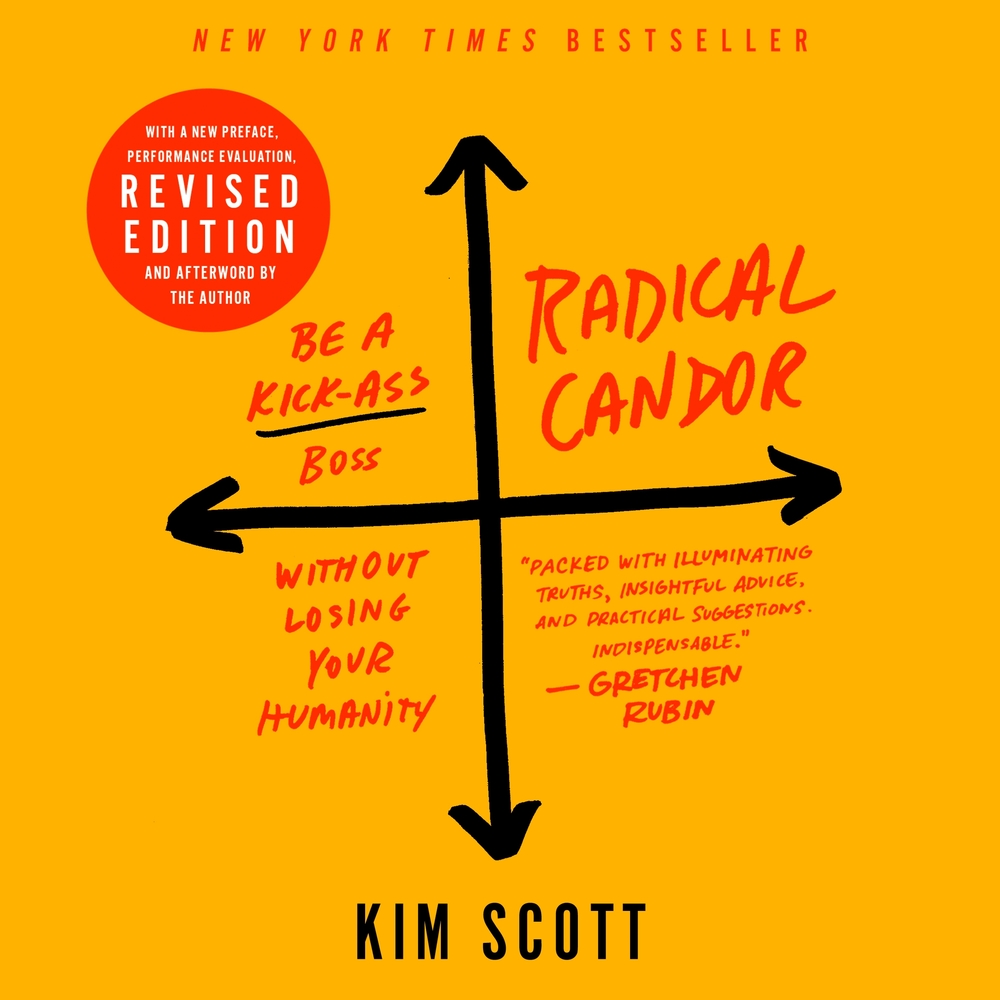What We're Reading Now
Thoughtful Candor is Better Than Radical Candor
8 April 2025
Barbara read Radical Candor by Kim Scott and appreciated some of the suggestions but reconfirmed her preference for thoughtful candor.
Tags: barbara read, communication, management and supervision, thoughtful candor
Kim Scott believes that to manage effectively, leaders must use Radical Candor which means you need to care personally, directly challenge your direct reports, and tell them the absolute truth when things have gone well or when they have gone wrong, giving detailed examples. She drove her point home by giving personal examples of when she had received Radical Candor.
One of the best examples was about her dog. She adopted a golden retriever and didn’t train Belvy properly. The dog was pulling at her leash at a busy intersection where cars were speeding by, and she was sweetly begging him to behave. A stranger said, “I can see you love your dog…..But that dog will die if you don’t teach her to sit….Then without asking for permission, the man bent down to Belvy, pointed his finger at the sidewalk, and said with a loud, firm voice, ‘SIT.’ She sat…. Then he said, ‘It’s not mean / It’s clear! The light changed and he strode off, leaving me with words to live by.” She carries the theme—it’s not mean, it’s clear— throughout the book.
Scott experienced Radical Candor from her boss, Sheryl Sandberg, right after she started to work at Google. She made a presentation describing the rapid growth in her area. Sheryl asked her to walk with her back to her office and told her first the details of what a good job she had done, and then said she needed to work on not saying “um” so much. “Google will pay for a speech coach.” Scott brushed off the comment twice saying it was just a verbal tic. Then Sandberg said, “You are one of the smartest people I know, but saying ‘um’ so much makes you sound stupid.” That got her attention.
Radical Candor requires getting to know your direct reports personally and directly challenging them in three-minute walks back to their office after an event and in weekly, one-hour 1:1 meetings if you have 10 or less direct reports. If you have more, cut the meetings to 25 minutes every other week. Our Allison Partners team recommends 15-minute meetings once a week and believes that if both the manager and employee are prepared, the check-in can be efficient. There may also be meetings about projects or team meetings throughout the week, but we believe that individual one-hour meetings a week just aren’t practical or necessary for most managers.

Directly challenge is Scott’s term for giving positive or negative feedback. Do it in person. Next best is video or phone. Try never to do it in email or text. If email is the only way, never “reply all.”
One of her examples of directly challenging— Instead of saying “You’re sloppy,” say “You’ve been working nights and weekends, and it’s starting to take a toll on your ability to catch mistakes in your logic.” When I was supervising people, I would also be specific about compliments that reinforced what I wanted from an employee. Instead of saying good job, I would describe exactly what I liked —your PowerPoint slides were clear without too much information. Your voice was strong and confident, you gave great understandable information, and you stopped on time.
Scott wants her direct reports to tell her the truth, and she plans to tell them the truth, too. What makes it go down smoothly enough is that you have created a personal relationship with them by listening to their stories and asking for feedback about how you are doing as a boss every time you meet with them.
If someone answered the question—what do you wish I would do more of and less of, she knew they were beginning to trust her. Even though she wanted negative feedback from her direct reports, she recommended that you gently test the concept of giving Radical Candor to your boss. If it would get you fired, and you don’t have another job lined up, keep silent.
To care personally, one manager she worked with said to his direct reports, ”Starting with kindergarten, tell me about your life.” He also asked about their job dreams rather than their goals. A survey showed his reports had increased optimism about their future at the company.
Learning from him, Scott carefully began to get to know her direct reports by saying—tell me about your childhood. If someone was troubled by the request, she backed off, but most people wanted to tell their story. Then she’d ask what are your dreams? She said, “It’s possible to care personally about a person who disagrees with your views on abortion or guns or God.”
Scott also asked questions to find out what was important to each person at work and then helped them get projects that moved them in the direction they wanted to go. Some people wanted to move up in the organization as fast as they could. Others wanted to excel at what they were doing and stay exactly where they were. She said you need both—the drive of the first kind and the stability of the second.

She had terms for when you were managing poorly, and I agree they are behaviors to avoid—Ruinous Empathy, Manipulative Insincerity, and Obnoxious Aggression.
Ruinous Empathy means “…being nice is prioritized at the expense of critiquing and therefore, improving actual performance.” Early in her career, she didn’t give a man negative feedback because she wanted to be nice. Eventually she fired him, and he was rightfully resentful because she had not been telling him what he was doing wrong.
Manipulative Insincerity is false praise and watered-down negative feedback to get what you want. “He’ll be happy if I tell him I liked his stupid presentation, and that will make my life easier than explaining why it sucked. In the long run, though, I really need to find someone to replace him.”
Scott said if you haven’t shown employees that you care personally about them, they will hear all criticism as Obnoxious Aggression. I thought it was going to mean yelling, but her definition is…”when bosses belittle employees, embarrass them publicly, or freeze them out.” But studies have shown that people would rather work for a competent boss who is a jerk than a nice boss who is incompetent, so “…if you can’t be Radically Candid, being obnoxiously aggressive is the second-best thing you can do.” This was a bridge too far for me, and it’s why I’m so grateful our Allison Partners team teaches people to deliver difficult feedback but to do it with thoughtful candor which still feels direct but less edgy to me.
I loved that she said before a difficult conversation, she writes down what she was going to say and then added, “I’ve found if I have written something down, it becomes almost impossible for me to wimp out of saying it.” That is true for me too, and this is how Allison Partners recommends you prepare to give negative feedback.
Before she started her own company, she worked for a diamond cutter in Moscow, Google, and Apple where the management styles were dramatically different. The book was too long, repetitive, and aggressive for my taste, but getting to know inside information on those big-name companies kept me reading. I was also interested every time she described things that she’d done wrong, what she learned from them, and what she recommended instead. If you'd like to get a taste of her approach to Radical Candor rather than reading the whole book, Allison blogged about an article by Scott in 2015.
While I think this book will give managers some useful ways to think about the importance of setting clear expectations and being truthful with employees, I still agree with Rachel and Allison that Crucial Conversations and It’s Okay to Be the Boss are the better books for helping managers to learn how to foster engagement and develop employees. If you’d like to learn more about our approach to thoughtful candor, Allison is teaching Setting Expectations and Giving Feedback on Wednesday, April 30 at the Hillsdale Conference Center here in Charlottesville. Details and registration information can be found here.







Comments
Our Comment Policy:
Our blog posts are only half of the conversation. What our readers have to say is equally important to us, and we're grateful for all the comments that continue the dialog.
To ensure that the discussion here is as useful as possible to all of our readers, please be respectful of our contributors and refrain from harassing, threatening and/or vulgar language. We reserve the right to screen and remove any comments from the site. If you have a question about a comment or want to discuss our policy, please contact us. We'll talk it over.
There are no comments for this entry yet.